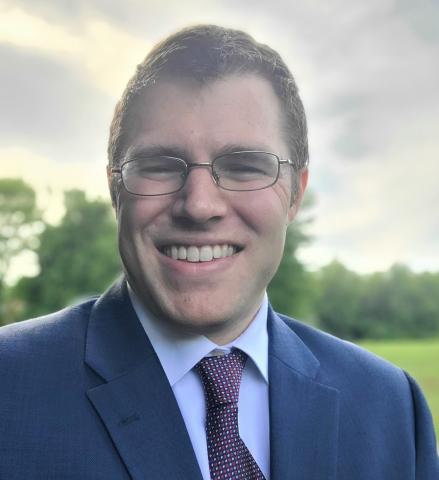Clarkson Professor McCrum Receives NSF CAREER Award for Electrocatalysis Research
Ian McCrum, an assistant professor of Chemical and Biomolecular Engineering at Clarkson University has been awarded the National Science Foundation (NSF) CAREER Award for his research titled “Predictive design and control of the electrode/electrolyte interface for improved electrocatalysis.” The $601k in funding begins on June 1, 2024 and is good through May 31, 2029.

Electrocatalytic reactions are a type of chemical reaction in which renewably generated electricity, such as from solar or wind, can be used to produce sustainable chemicals. The electrocatalytic reduction of CO2, for example, converts the greenhouse gas carbon dioxide (CO2) into useful products such as ethylene, a valuable chemical that is used to make plastics. Such a process helps to close the carbon cycle, reducing the amount of greenhouse gases in the atmosphere. This reaction, however, is very complex; many different factors impact its efficiency and cost-effectiveness.
“In this project, we will use a combination of detailed experiments and quantum-mechanics-based computational modeling to understand how the choice of operating conditions, namely the solvent and ions present during CO2 reduction, dictate the rate, selectivity, and efficiency of this reaction,” McCrum said. “By understanding how solvent, ions, and CO2 reduction intermediates interact at the surface of the catalyst at the atomic scale, we will develop fundamental insight into how electrocatalytic reactions work, and develop practical approaches to improve CO2 electroreduction efficiency and lower its cost.”
This grant will allow McCrum’s group to perform cutting-edge, foundational research in
electrocatalysis using their unique computational and experimental expertise, furthering their aim to enable the production of fully sustainable and carbon-neutral chemicals. The grant supports 1.5 graduate students for five years and research experiences for up to eight undergraduate students for the next five summers – giving these students hands-on experience in the lab and in quantum mechanics-based computational modeling.
“The grant also supports innovative outreach activities that enable us to share the knowledge we have gained in the lab,” McCrum said. “This will include developing an annual two-day workshop for high-school students hosted at Clarkson University, where they will perform hands-on experiments and computational modeling in various research labs at Clarkson and learn about sustainable chemical production and the impact of chemical engineering.”
McCrum joined Clarkson in 2020. He received his bachelor’s degree in Chemical Engineering from Clarkson University in 2012 and his Ph.D. in Chemical Engineering from Penn State in 2017. He then was a postdoctoral fellow at Leiden University in the Netherlands from 2017-2020.
